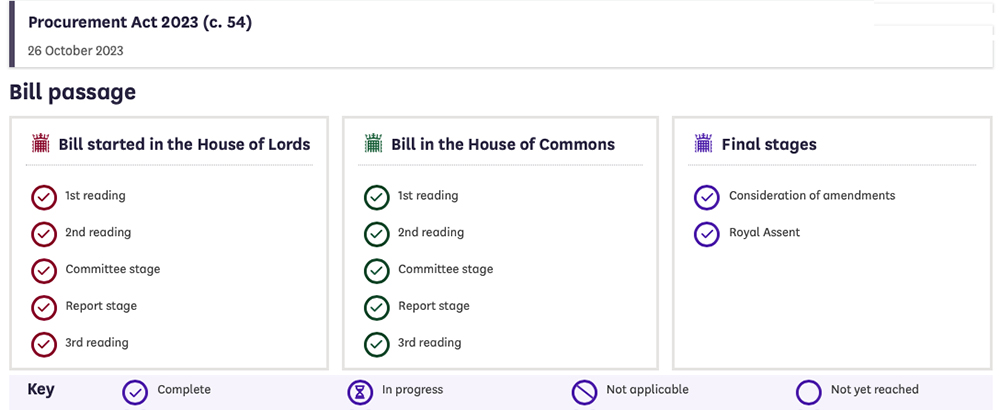Procurement Act 2023
Contents |
[edit] Background
On October 26 2023, 18 months after the first reading of the Procurement Bill, the legislation received Royal Assent, meaning the Procurement Act will become law. The changes will apply to the procurement processing of devolved authorities in Wales and Northern Ireland, but Scotland, will maintain its own legal framework.
The Procurement Bill was written following two years of consultation and policy development following Brexit. The Procurement Act 2023 effectively represents a rewrite of public procurement rules, moving away from EU Directives and generally consolidating separate sets of regulations covering public sector contracts, such as utilities, defence and concessions.
On 24 February 2025, The Procurement Act 2023 became law, changing the rules that shape how public bodies buy goods and services. On the same date the government published 'The Procurement Act 2023: A short guide for suppliers' alongside its establishment of the Procurement Review Unit (PRU) the body with the responsibility for oversight of the new Procurement Act. It will ensure that the changes are embedded within contracting authorities, investigate contracting authorities, to ensure compliance as well as suppliers, for possible addition to the debarment list. Private utilities and some NHS personal care services are, however, out of scope of the PRU.
On 26 February 2025 the 'Grenfell Tower Inquiry Phase 2 Report: Government response' was presented to Parliament by Angela Rayner the Deputy Prime Minister and Secretary of State for Housing, Communities and Local Government. The government has responded piece by piece to the 58 recommendations given by the inquiry in its 11 chapter policy paper, a long awaited and anticipated official acknowledgement of the outputs and steps forward. Within this report the government also confirmed that it was investigating seven of the organisations criticised in the final Grenfell inquiry report with the potential outcome being that they are barred from public contracts.
[edit] Key elements of the new act
The new Act simplifies the bidding processes to make it easier to bid, negotiate and work in partnership with the public sector - including a new ‘competitive flexible’ procedure. It aims to make commercial frameworks more open, so prospective suppliers are not shut out for long periods of time. It will remove bureaucratic barriers for smaller businesses and VCSEs (Voluntary, Community, and Social Enterprises) so they can compete for more contracts, including strengthened provisions for prompt payment throughout the supply chain. It requires that public bodies provide consistent feedback for suppliers and bid assessments for final tenders.
Find a Tender, will be a central open digital platform, to make it easier to find and bid for contracts. The platform will have a simple registration approach, storage of business details, with the ability to manage and update these as well as set up alerts for tenders.
The Procurement Review Unit (PRU) has been established to engage with contracting authorities across all sectors and suppliers to achieve the shared ambition to raise standards. The service will cover three areas:
- The existing Public Procurement Review Service (PPRS)
- A new Procurement Compliance Service (PCS)
- A new Debarment Review Service (DRS)
The key elements of the act are further outlined below:
[edit] Beyond price
A move from evaluating the “most economically advantageous tender” to the “most advantageous tender” when assessing the “best tender”, implying that contracting authorities should, as a matter of course, look beyond pricing to secure solutions which meet the UK’s wider sustainability agenda and other KPIs.
[edit] Flexible frameworks
The Act is less prescriptive in terms of the purchasing systems and frameworks to be used, introducing greater flexibility in the use of open and closed frameworks, as well as extending the potential period of use of the latter.
[edit] Exclusion of tenderers
Greater discretion is given to the procuring authority in terms of exclusions, and a debarment register will be introduced listing companies that might be excluded from tenders for serious breaches of contract, poor performance or acting improperly. These exclusions may also apply to entities connected to the previous tender including sub-contractors for a specified period but suppliers may apply for their removal from the list following a material change in circumstances.
[edit] Direct awards
A Minister of the Crown has an increased ability to direct an award, if considered necessary to “protect human, animal or plant life or health, or protect public order or safety” for example in extreme circumstances such as a pandemic.
[edit] Contract change notices
There are routes to modifying awards during their terms, through safe harbours occurring on the basis of known risks, the protection of life, or new technology for example in defence contracts. Any such changes will be subject to the increased use of contract change notices and any contract changes will need to be published.
[edit] Payment terms
There is a requirement for invoices to be paid within 30 days.
[edit] KPI reporting
The Act goes beyond the governing of post award contract modifications, requiring key performance indicators within contracts and for these to be assessed, reported on and published annually.
[edit] CIAT welcomes implementation of Procurement Act 2023
CIAT welcomes the implementation of the Procurement Act 2023, which aims to modernise streamline procurement across England, Wales and Northern Ireland. Eddie Weir PCIAT, CIAT President, said:
"We are pleased that, after a great deal of work by many people across UK Industry and in parliament, and after a change of government, the Procurement Act is now coming into force.
Effective public procurement at its best can drive both social and economic value. With our built environment badly in need of regeneration, public procurement can deliver the next generation of high-quality, sustainable and well-designed schools and hospitals, libraries and leisure centres.
We are particularly pleased that the act goes further in facilitating SME participation, mandating simplified contract management and payment processes, and focusing on quality rather than favouring the cheapest bid.
Importantly, the Act also makes clear that any conditions on participation must be proportionate means of ensuring that a supplier has the technical ability to perform a contract, and where these conditions include requiring a specific qualification, equivalent qualifications must also be accepted. This provides an important foundation for fair procurement of services provided by Chartered Architectural Technologists.
There will of course be challenges as the Act is implemented. CIAT will continue to work with individual contracting bodies and government to embed fair procurement."
More information on the changes to procurement can be found on CIAT’s Procurement web pages.
[edit] ECA welcomes Cabinet office payment rules
Leading electrotechnical and engineering services body ECA has welcomed the new Procurement Bill which was granted Royal Assent. The Act provides for simpler procurement processes to support small businesses, and protect against national security risks in public contracts.
Rob Driscoll, ECA Director of Business Policy & Practice, who sits on the SME business advisory panel to the government, said:
“The new Act will be a huge help to construction sector SMEs, which includes the majority of ECA Members. It will simplify UK procurement and make it more efficient than ever. The Cabinet Office team are to be congratulated on their work.”
Key features of the Act noted by ECA include:
- Changing the criteria from ‘Most Economically Advantageous Tender’ to ‘Most Advantageous Tender’ in order to ensure value, and avoid a ‘race to the bottom’ approach
- Ensuring that 30-day payment terms are an implied term in every public sector contract.
- Ensuring that all public and private sector large organisations must report on their payment performance
Rob Driscoll has been invited to 10 Downing Street in December to continue working on improving Government payment rules and the wider business environment for SMEs and ECA Members.
[edit] Further comments on the new act
During the second reading the Minister for the Cabinet Office and Paymaster General (Jeremy Quin), said the Bill would fundamentally improve the UK’s public procurement regime, creating “a simpler, more flexible commercial system that better meets our country’s needs”. By delivering value for money, the Bill requires public sector contracting authorities to weight to bids that support wider public benefit such as enhancing skills, innovation, and environmental protection as well as making it easier for small and medium-sized enterprises (SMEs) to become government suppliers.
Opposition parties welcomed the reforms but said the Bill fell short in various aspects, such as transparency, addressing potential conflict of interests and support for SMEs. The Labour Party said the reform was “an opportunity to make, buy and sell more in Britain”.
Parliamentary Secretary for the Cabinet Office Alex Burghart said:
"This Act is all about supporting British business using the opportunity of Brexit, as we change the way government works so it delivers better for people across the country. In particular, we draw on the new freedoms available to us by leaving the European Union to embrace and best support our small and medium sized businesses."
The Act will streamline the way that companies bid for public contracts, while also giving procurers more room for negotiating prices and innovative solutions with these companies. These reforms will deliver better value for money, slash red tape, drive innovation and make it easier for suppliers of all sizes to do business with the public sector"
Cabinet Office Minister Baroness Neville-Rolfe said:
"These new rules will help grow the economy and deliver better and simpler public sector procurement. I am particularly pleased to help small and medium sized businesses secure a greater share of nearly £300 billion worth of government contracts."
The Act draws on newfound Brexit freedoms to create a more transparent procurement system - with clearer and faster competition processes in emergency situations, such as during health pandemics, ensuring that contracting authorities can act quickly and transparently to buy vital goods.
This article is based on various government sources along with the press release "Small businesses to benefit from one of the largest shake ups to procurement regulations in UK history" dated October 26, 2023 and "ECA welcomes new Cabinet Office payment rules" from the ECA news and blog site dated November 1.
[edit] Related articles on Designing Buildings
- Best value procurement.
- Common minimum standards.
- Dynamic purchasing system under the Single Procurement Document (Scotland).
- Fair payment practices.
- Independent review of construction frameworks.
- Infrastructure and Projects Authority.
- Integrated Supply Team.
- Management Consultancy Framework MCF.
- Managing the procurement process.
- Major Projects Authority.
- Output-based specification.
- Procurement Policy Note 12/15.
- Procurement policy note PPN.
- Procurement route.
- Public procurement.
- SMEs and government contracts.
- Sourcing playbook.
- Transforming Public Procurement Green Paper.
Featured articles and news
Gregor Harvie argues that AI is state-sanctioned theft of IP.
Preserving, waterproofing and decorating buildings.
Many resources for visitors aswell as new features for members.
Using technology to empower communities
The Community data platform; capturing the DNA of a place and fostering participation, for better design.
Heat pump and wind turbine sound calculations for PDRs
MCS publish updated sound calculation standards for permitted development installations.
Homes England creates largest housing-led site in the North
Successful, 34 hectare land acquisition with the residential allocation now completed.
Scottish apprenticeship training proposals
General support although better accountability and transparency is sought.
The history of building regulations
A story of belated action in response to crisis.
Moisture, fire safety and emerging trends in living walls
How wet is your wall?
Current policy explained and newly published consultation by the UK and Welsh Governments.
British architecture 1919–39. Book review.
Conservation of listed prefabs in Moseley.
Energy industry calls for urgent reform.
Heritage staff wellbeing at work survey.
A five minute introduction.
50th Golden anniversary ECA Edmundson apprentice award
Showcasing the very best electrotechnical and engineering services for half a century.
Welsh government consults on HRBs and reg changes
Seeking feedback on a new regulatory regime and a broad range of issues.

























